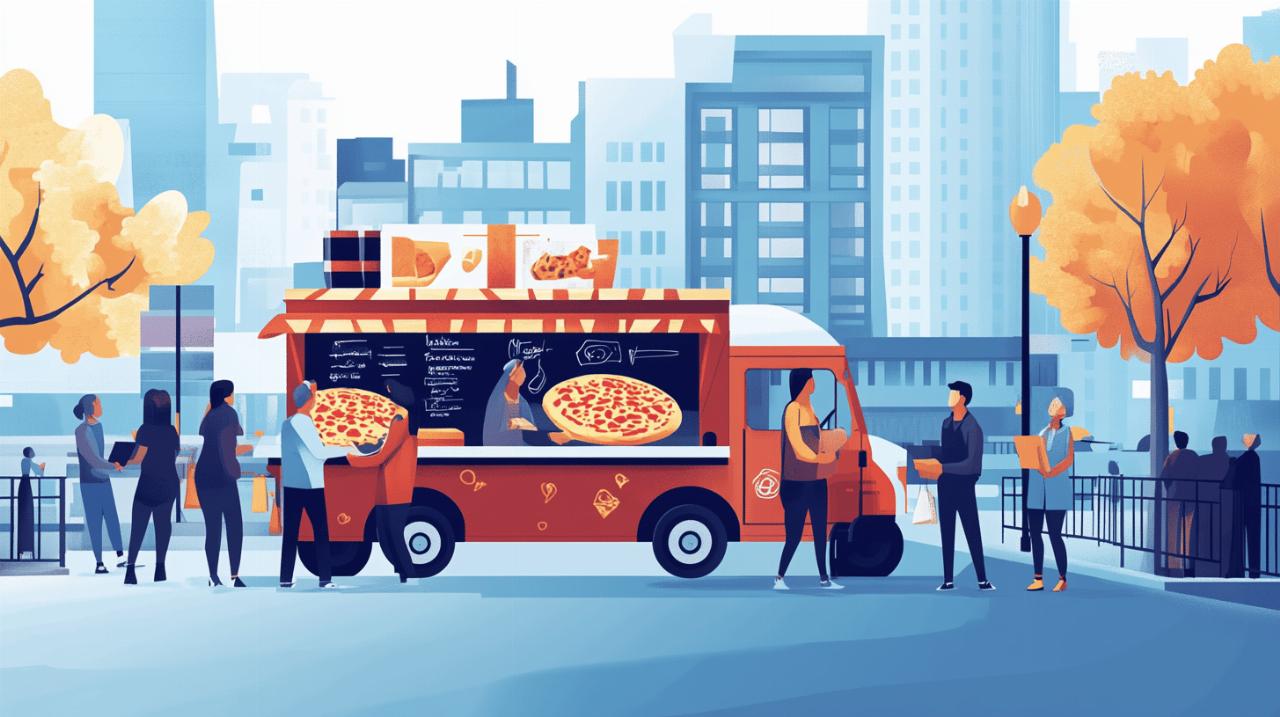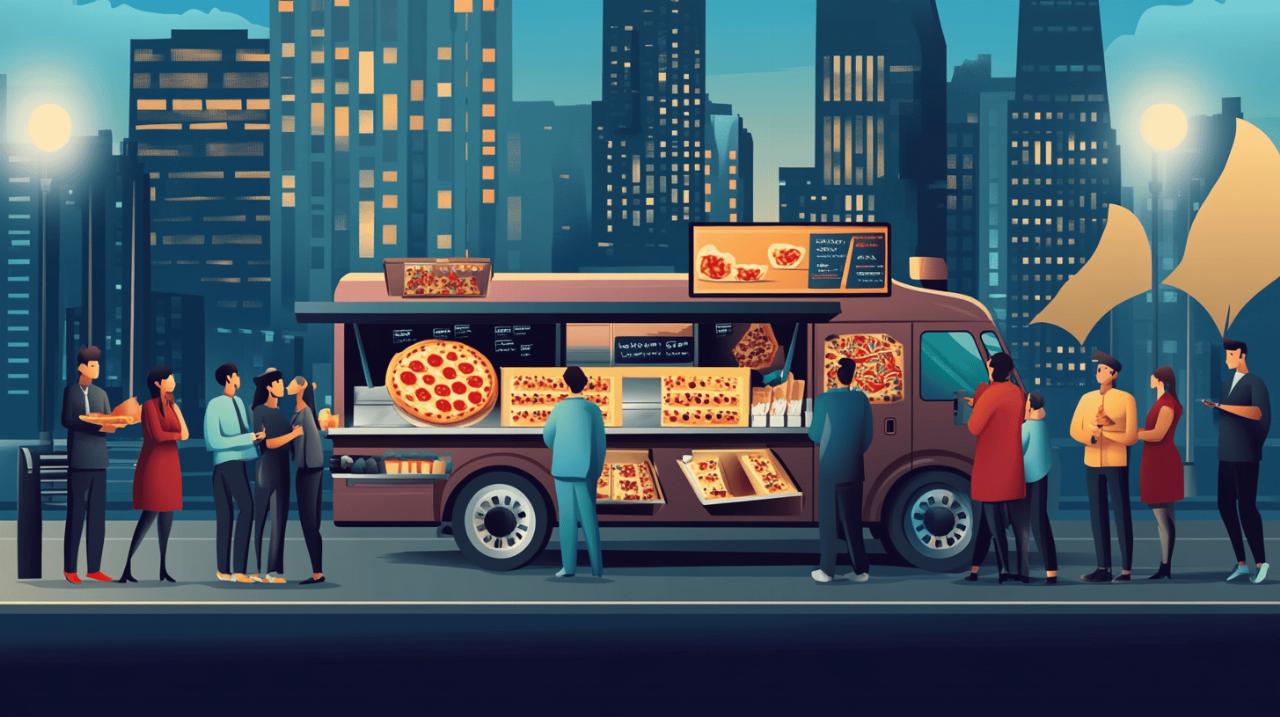The Ultimate Guide to Les demarches a realiser pour ouvrir un camion a pizza: Vehicle Selection and Conversion
Choosing the right business structure
When embarking on your pizza truck venture in France, one of the first critical decisions you'll face is selecting the appropriate legal structure for your business. This foundational choice will impact everything from your taxation to personal liability and operational flexibility. The French system offers several options, including SAS, Micro-Entreprise, SASU, SARL, and EURL, each with distinct advantages depending on your specific circumstances and growth aspirations.
Sole trader vs limited company considerations
As a potential pizza truck owner, you might be torn between the simplicity of a sole trader setup (Micro-Entreprise or Individual Enterprise) and the enhanced protection of a limited company format (SARL, SAS or SASU). The Micro-Entreprise structure offers straightforward accounting and lower administrative burdens, making it particularly attractive for newcomers to the food truck scene. However, this comes at the cost of unlimited personal liability, meaning your personal assets could be at risk if the business faces financial difficulties.
Conversely, establishing a limited company such as an SARL or SAS creates a separate legal entity, effectively shielding your personal assets from business liabilities. This structure also tends to project a more professional image to potential investors, suppliers, and even customers browsing for their next pizza fix. The downside includes increased paperwork, more complex accounting requirements, and higher setup costs that might strain your initial budget for vehicle customisation and equipment.
Tax implications and legal requirements
Each business structure carries its own tax regime in France. Micro-Entreprises benefit from simplified taxation based on turnover rather than profit, with social charges calculated as a percentage of revenue. This straightforward approach can be advantageous during your initial trading period when administrative bandwidth is limited. For limited companies, corporation tax applies to profits at varying rates, potentially offering tax efficiencies as your pizza truck business grows.
Regardless of structure, you'll need to register your business officially. This involves completing registration procedures through the appropriate channels and obtaining a SIRET number. The registration document for your vehicle must specifically state « VASPMagasin » designating it as a specialised vehicle for commercial purposes. This classification is non-negotiable for food trucks operating legally in France and will be checked during regulatory inspections.
Crafting a comprehensive business plan
A thorough business plan serves as the roadmap for your pizza truck enterprise, helping you navigate challenges and capitalise on opportunities. This document should outline your concept, target market, operational strategy, and financial projections. Beyond being a planning tool, a well-crafted business plan proves essential when approaching banks or investors for funding, demonstrating that you've considered all aspects of the pizza truck business model.
Market research and menu development
Understanding your potential customers is crucial for success in the competitive mobile food industry. Conduct detailed market research to identify your target audience's demographics, including age, dining habits, and average spending. This information will inform everything from your menu design to pricing strategy and location selection. For instance, a pizza truck near university campuses might focus on affordable options with creative toppings, while one operating near business districts might emphasise quick service and premium ingredients.
Your menu development should strike a balance between creativity and practicality. Consider the constraints of cooking in a mobile kitchen while offering something distinctive that sets you apart from competitors. Whether you're planning to specialise in American street-style pizza, traditional Italian variants, or innovative fusion concepts, ensure your offerings align with both your passion and market demand. Remember that menu complexity directly impacts equipment needs, preparation time, and ultimately, your truck's layout design.
Financial projections and funding options
Creating realistic financial forecasts involves estimating both your startup costs and ongoing operational expenses. Initial investments typically include the truck purchase or lease, conversion costs, equipment, branding, permits, and initial inventory. Ongoing expenses encompass ingredients, packaging, fuel, maintenance, staff wages, permit renewals, and insurance premiums. Most financial advisors recommend having a contingency fund of at least 20% above your estimated needs to handle unexpected costs.
When it comes to financing your pizza truck dream, French entrepreneurs have several avenues to explore. Traditional bank loans typically require a personal contribution of 20-30% and offer repayment terms of 5-7 years. Business startup support programmes provided by regional authorities might offer grants or low-interest loans for new enterprises. Crowdfunding platforms represent an increasingly popular alternative, not only raising capital but also building a customer base before you even start trading. Some entrepreneurs also consider equipment leasing to reduce initial capital requirements, particularly for the more expensive kitchen installations.
Selecting the Perfect Location and Vehicle
 The success of your pizza truck business hinges significantly on two physical elements: where you operate and what you operate from. Your ability to attract customers depends on visibility, accessibility, and the match between your offering and local demand. Similarly, your vehicle choice impacts not only your capital investment but also your operational capabilities and brand image.
The success of your pizza truck business hinges significantly on two physical elements: where you operate and what you operate from. Your ability to attract customers depends on visibility, accessibility, and the match between your offering and local demand. Similarly, your vehicle choice impacts not only your capital investment but also your operational capabilities and brand image.
Scouting prime trading spots and council regulations
Finding optimal locations requires strategic thinking about pedestrian traffic, competing food offerings, and local events. High-visibility areas near offices, universities, tourist attractions, or event venues typically offer good customer flow. However, these prime spots often come with higher permit fees and more competition. Some pizza truck operators develop relationships with local businesses to park on private property, sometimes avoiding the more stringent public space regulations.
Securing trading permits is a non-negotiable aspect of location planning. For public spaces, you'll need to apply to the relevant local council, which may have specific zones designated for mobile food vendors. If operating outside your company's registered area, a travelling salesman permit becomes necessary. Many successful food truck businesses establish a rotation of locations throughout the week, creating a consistent schedule that regular customers can rely on. Remember that location permits often need renewal, so factor this administrative requirement into your business calendar.
New vs Used Food Trucks: Making the Smart Choice
The vehicle itself represents one of your largest initial investments. New purpose-built food trucks offer the advantage of customisation to your exact specifications and typically come with warranties reducing short-term maintenance concerns. However, they command premium prices that can significantly impact your startup capital. Many manufacturers specialise in food truck conversions and can create bespoke designs incorporating your branding and specific equipment needs.
Used food trucks present a more budget-friendly alternative, potentially costing 40-60% less than new equivalents. However, they may require renovations to meet current hygiene standards and your specific operational requirements. When evaluating a used vehicle, pay particular attention to the engine condition, electrical systems, gas installations, and any existing food preparation surfaces. Regardless of whether you choose new or used, ensure the interior layout facilitates efficient workflow from food preparation to customer service, with appropriate storage, refrigeration, and cooking capacity for your menu.
Sorting licences and food safety compliance
Operating a pizza truck business in France means navigating a comprehensive regulatory framework designed to ensure food safety and business legitimacy. Meeting these requirements isn't merely about legal compliance; it demonstrates professionalism and builds customer trust in your food quality and safety practices.
Essential certificates and training courses
Food hygiene training is mandatory for anyone handling food products in France. This training must be renewed every three years and covers critical aspects of food safety, temperature control, cross-contamination prevention, and personal hygiene. Beyond being a legal requirement, this knowledge helps protect your customers and reputation. Additional certifications might be necessary depending on your menu offerings; for instance, if you plan to serve alcoholic beverages with your pizzas, you'll need a specific licence for alcohol sales.
Your pizza truck must also meet various safety standards. Gas installations, commonly used for pizza ovens, require an NFS 56200 certificate and must follow strict safety protocols, including proper ventilation and external storage of gas bottles. Fire safety equipment, particularly appropriate fire extinguishers, must be readily accessible within the vehicle. These safety measures protect not only your investment but also your staff and customers, while demonstrating compliance during inspections.
Registration process and permit applications
The registration process for your pizza truck business involves several administrative steps beyond choosing your legal structure. You'll need to register with the appropriate chamber of commerce or trades, depending on your business classification. This registration generates your unique business identification numbers needed for all official documentation. Your vehicle must be properly registered as a commercial vehicle with the designation « VASPMagasin » on its documents, indicating its specialised commercial use.
Insurance requirements include both standard vehicle insurance and commercial liability coverage protecting against various business risks. The latter typically covers food safety incidents, property damage, and potential customer injuries. Some insurance providers offer specialised policies for food trucks that bundle these necessary coverages. When applying for trading permits, you'll likely need to provide proof of this insurance coverage, along with your business registration documents and food safety certifications. While the application process might seem daunting, local business support services can often provide guidance on navigating these requirements efficiently.
